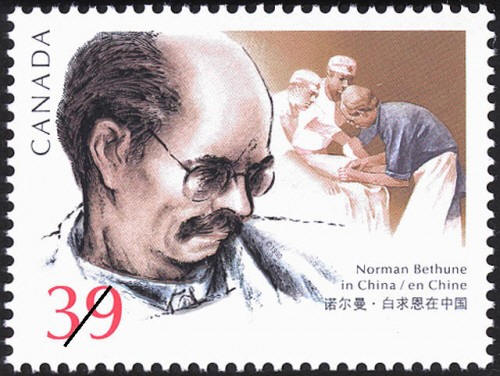|
Dr. Norman Bethune:
China's Hero, Canada's Traitor

An article in the Toronto Star quotes Treasury Board President Tony
Clement: "When Chinese schoolchildren are taught about the value of
helping humanity, the story they are told is the Norman Bethune story."
There are a couple of aspects of this quote that are worth examining.
Dr. Norman Bethune was born in 1890 in Gravenhurst, Ont., which is a
part of the Parry Sound-Muskoka riding represented by MP Clement.
Bethune lived the first three years of his life in Gravenhurst, but has
become something of a cottage industry for the town when it was realized
the Chinese had elevated him to icon status.
He's become a tourist attraction for Chinese visitors. The house where
he was born has been declared a Heritage site, and when she was
Governor-General, Adrienne Clarkson unveiled a statue of him.
Gravenhurst tourist bumpf advertises: "Home of a hero!"
The Chinese donated a statue to Bethune in Montreal (where he lived for
eight years), and China itself is loaded with statues to him, ever since
Mao Zedong wrote a tribute to him, and designated him as an official
hero of Communism. As in his life, controversy clings to Bethune in
death.
Crusty, nasty-tempered, impatient, and a heavy drinker though he was (or
became), as a medical doctor he was ahead of his time and genuinely saw
"socialized" medicine as the way to go. After serving briefly as a
stretcher-bearer in WWI, he completed his medical degree at the
University of Toronto, and then joined the Royal Navy as a
surgeon-lieutenant.
In 1935 he joined the Communist Party and in 1936 went to the Spanish
civil war where he developed battlefield blood transfusions that cut
down deaths caused by loss of blood. Bethune's real fame occurred after
he went to China to serve as a doctor for Mao Zedong's guerrilla army.
He nicked his finger during an operation and subsequently died of blood
poisoning, leaving a death-bed message for Tim Buck, who headed Canada's
communist party.
Virtually unknown in Canada, and certainly unheralded, Bethune was
magnified and glorified by Mao and Chinese communists who declared him a
national hero. In the mid-1960s, the Canadian government suddenly
realized that Bethune's name was useful in selling wheat to China -- the
first billion-dollar contract signed at that time. While Bethune is a
genuine hero to Chinese and other communists, his links to Canada are
only that he was born and educated here.
Tony Clement's view of Bethune's story impressing Chinese children of
the "value of helping humanity" is something of a stretch, since
everything China does is based on helping themselves. What the Chinese
regime has done for humanity is obscure. Self-interest is the motivation
of the present Chinese regime, be it selling body parts of people
executed for crimes, or even the body parts of dissidents (as claimed by
the Falun Gong meditationists). Or selling unwanted girl babies to
foreigners willing to pay, or kidnapping and imprisoning expatriots from
neighboring countries.
This is hardly "helping humanity."
Bethune was not in China to help humanity, but to help Mao's communist
army. It was not sick people he tended, but wounded communist soldiers.
Around 1970, China seemed to realize that their deification of Bethune
had commercial and psychological value in dealing with Canada. Every
time a Canadian political or trade delegation visited China, they got
the homage to Bethune treatment. Even Canadian tourists were subjected
to it.
Canadians became conditioned to the idea that by publicly revering
Bethune, it gave them an advantage with the Chinese -- while the Chinese
felt similarly the other way around. I recall meeting with Michel Gauvin
in Beijing -- Canada's ambassador to China at the time. I knew Gauvin
(since deceased) when he was ambassador to Lebanon and Greece, and also
when he was a member of the International Control Commission (ICC) in
Vietnam, reporting on cease fire violations.
Gauvin was a superb diplomat, and an outspoken one. No nicely-nicely
pussyfooting for him. He was direct, blunt, honest and trusted. At time
of our meeting in Beijing, 1982, Gauvin recalled his first official
banquet as Canada's ambassador, where China's foreign minister proposed
a toast to Norman Bethune.
After the dinner Gauvin discreetly buttonholed the foreign Minister. "I
would appreciate it," he said, "if for the duration of my time in China
as Canada's ambassador, there be no more toasts in my presence to Dr.
Bethune. I feel I must tell you that I do not consider Dr. Bethune a
Canadian patriot, but hostile to the values of my country."
Gauvin said the foreign minister stared at him for a moment, then broke
into a big grin of understanding. "It was the last time the Chinese
mentioned Dr. Bethune's name in my presence," recalled Gauvin. All of
which indicates that the Chinese knew perfectly well what they were
doing when they brought up Dr. Bethune's name in dealings with
Canadians.
The same can probably be said of Gravenhurst's relatively recent
fixation on Norman Bethune -- it's good for business, he's a tourist
attraction to be exploited. This time by capitalism. The irony is that
were Bethune alive, he'd be outraged and horrified at how he is
manipulated -- by communists to get deals with capitalists, and by
capitalists to be favoured by communists.
|
